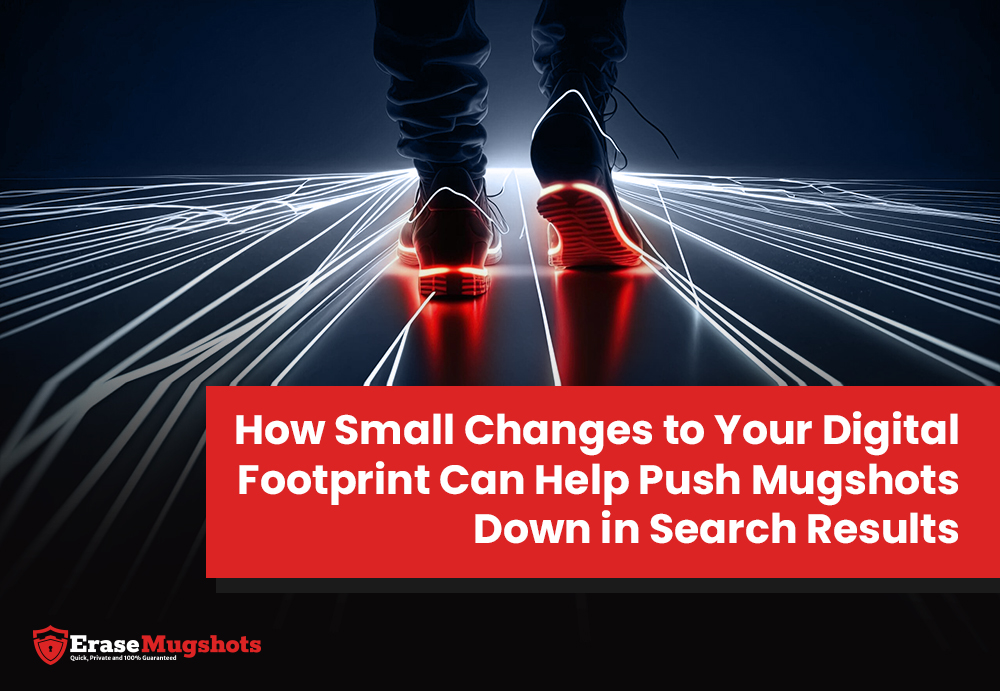100% Satisfaction Guaranteed
We offer a total mugshot removal solution to remove your mugshot and arrest details from the internet once and for all.

Table of Contents
Your digital footprint is the record of everything you do online. Every time you make an online purchase, engage on social media platforms, or browse the internet, your data is collected. This data includes your IP addresses, location, online activities, and even private data such as financial data, phone numbers, and personal details.
However, not all digital footprints are the same. Some of this data is created intentionally—such as social media posts, account sign-ups, or publishing content—which forms your active digital footprint. Meanwhile, your passive digital footprints are formed when websites, apps, and online platforms track your behavior without direct input, such as when search engines log your queries or websites store cookies to track your visits.
The challenge? While your positive digital footprint can enhance your online identity, negative consequences arise when unwanted content—such as old social media posts, outdated accounts, or even mugshots—appears in search results.
If you’re unaware of what’s out there, you may have little control over how others perceive you online. That’s why it’s crucial to actively manage your own digital footprint and take steps to protect your online reputation.
Many internet users underestimate how much of their personal data is accessible. Your digital shadow follows you across devices, from your computer to your smartphone, tracking your every move. Employers, lenders, and even potential business partners search for you online before making decisions. What they find—an outdated profile, embarrassing social media posts, or even a public data breach—can impact opportunities.
Key risks include:
Taking steps to protect your online identity is not just about privacy—it’s about shaping the way others perceive you in professional and personal settings.
One of the most damaging aspects of a digital footprint is having negative content—such as mugshots—appear in search engines. Mugshots are considered public records, meaning they can be collected and posted on websites that profit from exposure.
While mugshots don’t necessarily indicate guilt, many online platforms make it easy for these images to show up in search results. This can have serious negative consequences, affecting business opportunities, job prospects, and personal relationships.
Even if you’ve moved on, your online reputation may still be tied to an incident from years ago. That’s why it’s crucial to take action to remove or suppress such content.
If damaging content like mugshots, outdated social media posts, or personal details are harming your online reputation, removal is the first step. Some websites allow users to request removal, while others require legal action or professional assistance.
If you’re struggling to remove negative content, working with an online reputation management service can help.
These strategies ensure that when people search your name, they find the best version of you—not outdated or negative content.
One of the best ways to take control of your own digital footprint is to actively shape it. Creating and optimizing social media accounts allows you to push positive content to the top of search engines.
Regularly updating your profiles ensures that the most relevant and positive information about you appears in search results.
Your online activities should be secured to prevent identity theft and data breaches.
By securing your accounts and devices, you reduce the chances of unauthorized access to your personal data.
To stay ahead of potential risks, set up Google Alerts for your name. This notifies you whenever new content appears in search engines.
Other tools for monitoring your digital footprint include:
Staying informed helps you address issues before they escalate.
A VPN helps protect your online activities by masking your IP addresses and encrypting your internet connection. This prevents hackers and websites from tracking your browsing habits and collected data.
By using a VPN, you minimize your passive digital footprint, making it harder for companies and bad actors to exploit your information.
Your digital footprint is a reflection of your actions online. Whether through social media posts, online purchases, or website visits, your footprint shapes how others see you.
The internet may never forget, but you have the power to control your narrative. If you need help managing your online reputation, professional services can ensure that your digital footprint works for you—not against you.
We offer a total mugshot removal solution to remove your mugshot and arrest details from the internet once and for all.